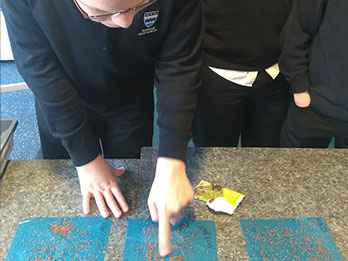A small group of learners from Norham High School, North Shields, were struggling with their Science GCSE. The school decided to deliver ASDAN’s Science Short Course as an alternative option. Helen Ashburner, Learning Support Co-ordinator for the school, discusses how the course brought science to life for the learners as well as helping them gain an ASDAN qualification along the way.
We have four learners doing the Science Short Course and all of them have either language and communication difficulties or autism. They were struggling with the Science GCSE, which was too difficult for them, and as a result we registered them for the Science Short Course in September 2015. Since then, they have all be awarded with a Short Course certificate for having gained two credits each for 20 hours of science-related activities. Undertaking the Science Short Course has guaranteed that they have science in their curriculum.
Because of their autism or learning difficulties, it is important this group of learners has a personalised curriculum. This is where the Science Short Course comes in. They get to chose from a wide range of activities across six modules: Human Machine; Forces and Motion; Chemical Change; Biological Challenges; Space Physics; and Performance in Sport. With guidance from me, the learners can choose the activities they want to undertake. There is a lot of flexibility in the course – each module allows students to create their own challenge in consultation with the teacher.

The learners have particularly enjoyed the project-based tasks they’ve undertaken. One of the activities they liked doing was challenge seven from Section A in Module 1 Human Machine. The learners enjoyed matching up different types of food with their nutritional properties. They then had to analyse a Roman banquet and plan menus for people who lived in Roman times.
Another aspect of the Science Short Course that suits these learners is that there is no exam at the end so there is no stress. Through the teamwork activities they undertook in the Science Short Course, the learners developed skills in collaboration with others. Sometimes people with autism or learning difficulties do not mix well with others and may prefer to work alone. But the students worked extremely well together, feeding back to each other on their progress and producing fantastic final group pieces of work.
A further significant benefit to the Science Short Course was that the learners were able to use the credits they had gained in this programme towards completing another ASDAN course they are undertaking: the Certificate of Personal Effectiveness (CoPE) Level 1 qualification. Not only did the learners gain a Short Course certificate, they now also have a qualification, which is another great achievement for them.
What’s next for these learners? They are continuing to undertake challenges from the Science Short Course with the aim of using the credits they gain towards completing their CoPE Level 2 certificate in July 2017.
Caption: learners germinate cress seedlings on damp paper towels as part of the Biological Challenges module in the Science Short Course
